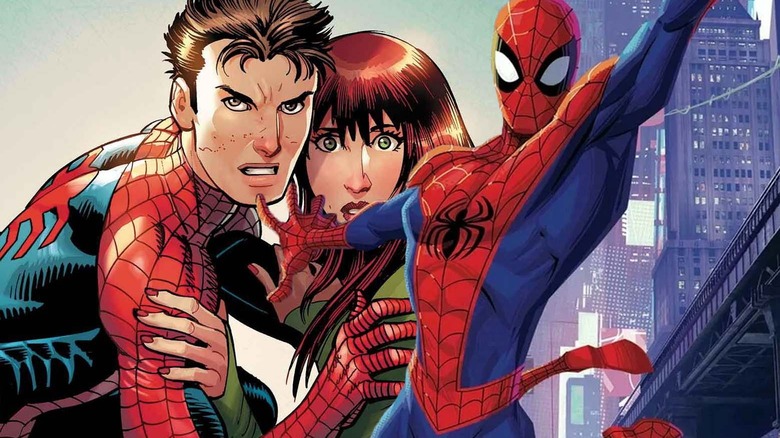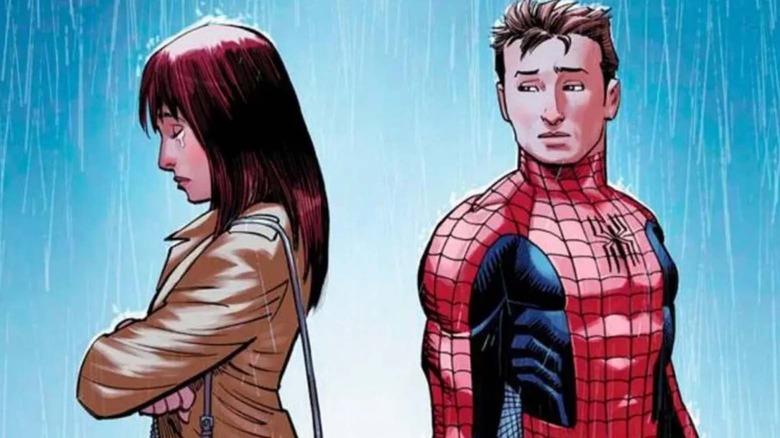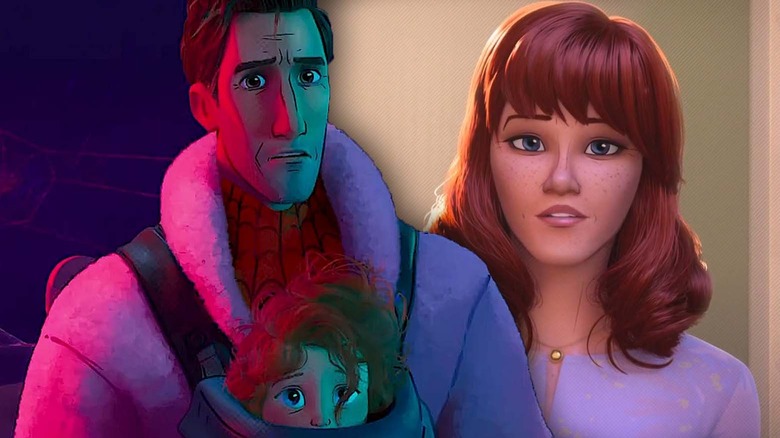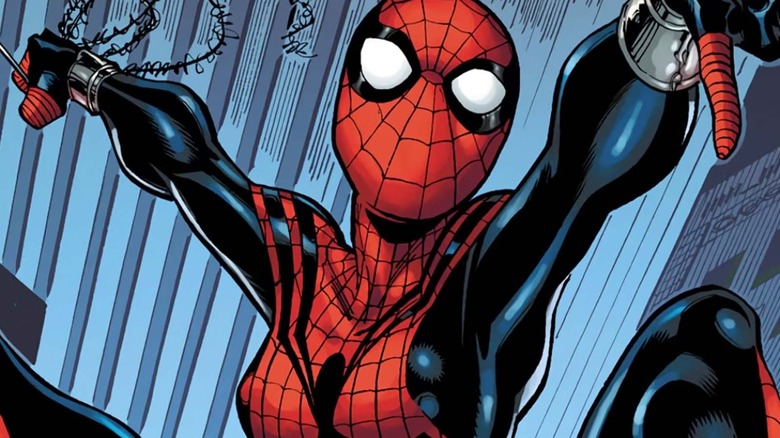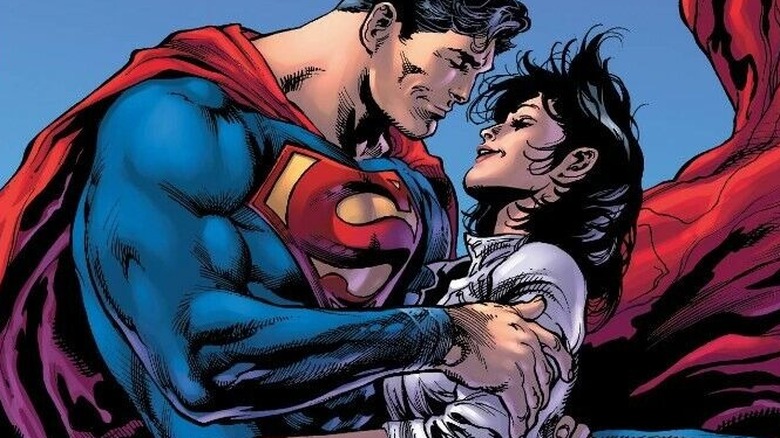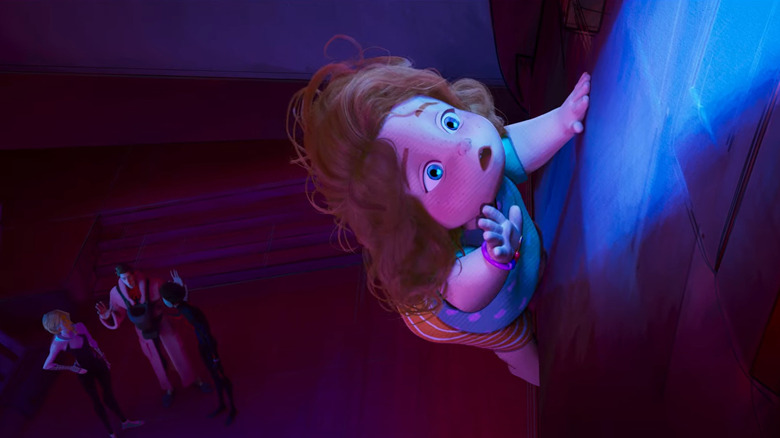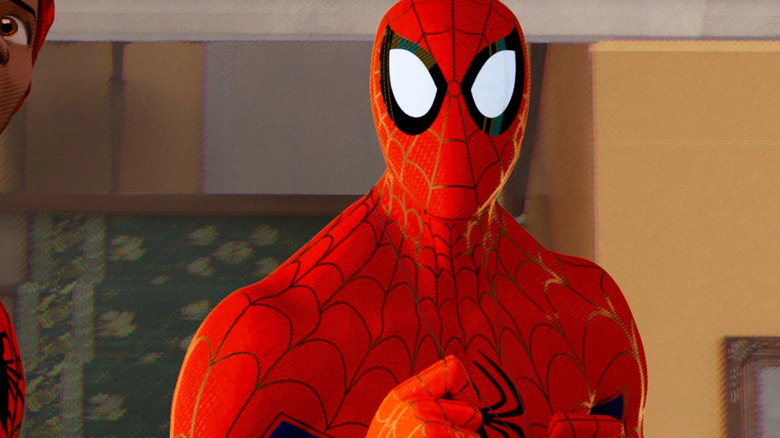Spider-Man: ATSV's Spider-Dad Is The Growth Peter Parker Needed For Decades (& The Comics Should Follow Suit)
Spider-Man is Marvel's biggest and most recognizable comic book hero. And yet, as the movies continue to highlight the best sides of Peter Parker, the comics have become an albatross around the character's neck.
This disparity hits a new milestone with the release of "Spider-Man: Across the Spider-Verse," a film which — as revealed by the trailers — shows what a mature, family-driven version of Peter Parker looks like, which Marvel should be aspiring to emulate in the comics. From his daughter May "Mayday" Parker making her big screen debut, to the snippets of Peter and MJ as a happily married couple, to the fact that the "Spider-Verse" Peter is successfully balancing his responsibilities as both a hero and a father ... well, it's exactly what comic readers have so desperately wanted, for decades.
Unfortunately, while the webslinger has thrived on the big screen, the comics have bottomed out at a shockingly low quality for a long time. While justifiable criticism has been levied at certain writers, it's not really their fault that Spider-Man comics have stagnated so badly: rather, actual blame goes to the editors responsible for guiding these storylines, and an editorial mandate that doesn't allow Peter Parker to grow up, evolve, be happily married, or have a family, despite the fact that other superheroes have done exactly that.
Spider-Man comics should take a page out of Superman or the Fantastic Four's playbook — two notable examples of comics which not only didn't suffer from the introduction of marriage and family dynamics, but actually got better. And as "Across the Spider-Verse" gets ready to bring a relatable family man version of Peter to mainstream attention, it's time for Marvel Comics to stop putting the character a box and expand the scope of what a Spider-Man story can be.
Marvel Comics keeps forcing a status quo that readers don't even want
From 1962 through the 1990s, Spider-Man was a story of a boy growing up, finishing school, getting married, and hitting all the major life milestones. In the 2000s, though — after a near-universally despised retcon of the marriage known as "One More Day" — Marvel Comics has made it crystal clear they have little intention in expanding Peter Parker beyond being a struggling bachelor who is (sometimes) in a rocky relationship with Mary Jane Watson.
Former "Amazing Spider-Man" writer Dan Slott once even admitted that Marvel's editorial stance against the idea of Peter and MJ being married (as they were, pre-retcon) is extraordinarily aggressive. As Slott wrote on the CBR message boards, "Every single editorial team since the marriage worked hard to undo it. You will not see the marriage restored in the core continuity ever...Again, believe all you want. Put MJ and her wedding dress or showing off her wedding ring in EVERY message board avatar in the world. Still never happening. Ever. Ever. Ever.Im sure Ill be here next year telling you the same thing."
As a result, Spider-Man's family life, as established before "One More Day," has been completely dismantled.
The critically-maligned comic is still deeply tied to every Spider-Man comic, to this day. Recently, writer Nick Spencer's run dropped numerous hints about fixing "One More Day," until at the last second retconning "Sins Past" (a different egregious storyline) instead, with many readers speculating that this change was forced by editorial. Since then, the publisher's obsession with keeping MJ and Peter apart has continued into the latest run, which gives MJ an entire secret family (with kids that, spoiler alert, aren't really hers and then mysteriously disappear) seemingly just to toy with readers.
Across the Spider-Verse is giving comic readers what they want, and casual fans are also loving it
In the "Spider-Man: Across the Spider-Verse trailers," Peter B. Parker (Jake Johnson), who reunited with Mary Jane at the end of the first movie, is shown to have taken a significant new step in life — that is, he and MJ have had a spider-powered child, Mayday Parker. The infant hero can be seen swinging across the lab of Miguel O'Hara (Oscar Isaac) before Parker is able to track her down and put the excitable youngster back into her baby carrier.
Now, comic fans will recognize Mayday as Spider-Girl, a superhero from the future that debuted in 1998. And regardless of whether the film just shows baby Mayday, grownup Mayday, or both, Spidey fans are just as thrilled to have her as they are jealous that this big screen version of Peter is getting the opportunity for growth that the comics version isn't allowed to have.
Permanently repairing the relationship between Peter and MJ in the comics wouldn't feel forced — it would be a natural progression, arguably demanded by their history together. It also opens up new storytelling avenues, instead of closing them down. This is embodied by what we've already seen of the "Spider-Verse" Peter, who goes from a depressed, defeated hero in the first film to a devoted husband and father in the second. Meanwhile, the comic book character is never given the chance to stop moping around or find stability, and as the fan base grows ever more resentful about the state of affairs, Spider-Man comics editor Nick Lowe seems content to mock the beloved romance on Twitter, much to the chagrin of the readers he's supposed to be entertaining.
Marvel is missing out on so many great Spider-Man stories that could be told
While seeing Peter and MJ continually split up, get back together, and repeat the cycle ad nauseum is difficult enough, the editorial mandate against Spider-Dad is also a major missed opportunity.
In "One More Day," Peter and MJ see visions of a redheaded daughter whose existence is canceled out by the same demonic pact that erases their marriage. That daughter is presumably Mayday, the same little kid who film audiences have immediately fell in love with. Spider-Man, as the everyman superhero, is perhaps the best character to explore such family dynamics with: how fun would it be to see him adding fatherhood to his list of responsibilities, whether it involves swinging after a spider-powered kid or telling her tales about her Great Uncle Ben?
Such stories have been explored outside the main continuity, specifically in the alternate universe "Spider-Girl" comics. But again, that means every version of Peter except the main comics one gets to grow, while the default Peter stagnates, even though fatherhood feels like a natural next step for the hero.
The insistence on Peter being single ignores that other characters have only grown better with the addition of family lives. Most notably, the Fantastic Four's stories weren't ruined when Reed Richards and Sue Storm got married, much less when they had Franklin and Valeria. Instead, the kids added a new dimension to the team's stories. Right now, Marvel seems so afraid to disrupt the status quo that their most popular hero's main title has become somewhat of a chore to read. Reversing "One More Day," reinstating the marriage, and adding a character like Mayday would breathe new life into a comic that desperately needs it.
Marvel could learn from how DC Comics repaired its damage to Superman and Lois
Back in the early 2000s, DC Comics came within striking distance of a Superman story that "Spider-Man: One More Day" seemed to borrow from extensively.
A pitch known as "Superman 2000," which talented writers Mark Waid, Grant Morrison, Tom Peyer, and Mark Millar were attached to, would've seen Superman's identity being exposed to the public. Making matters worse, Brainiac would've literally poisoned Lois' knowledge of her husband's secret identity, slowly killing her until Superman is forced to work alongside Mr. Mxyzptlk — who agrees to cure Lois, but at the cost of her memory of their life together being completely erased.
Thankfully, the story never came to be. Not so thankfully, Marvel gave nearly this exact story to Spider-Man, and the fan base has never recovered. Funnily enough, Marvel could now learn the right lesson from Superman, instead of the wrong one.
Back in 2011, during DC's "New 52" initiative, DC decided to break up Superman and Lois via a universe-wide reboot, and they twisted the dagger by having Lois expose Clark Kent's identity to the world, leading to him beginning a superhero-focused relationship with Wonder Woman. Fans hated it, and DC — instead of doubling down, as Marvel has — realized they'd made a mistake. The marriage was restored in the crossover event "Convergence," they were given a son named Jon Kent (now a fan-favorite character himself) and DC has moved on. Superman's new dynamic as a family man hasn't just gained fan and sales adoration, either, but directly led to the creation of the CW series "Superman and Lois." For Superman, the controversy was a blip on the radar. Meanwhile, Marvel has waded in the muck of "One More Day" for almost two decades.
Can cross-media synergy finally release Spider-Man from this editorial trap?
For viewers who will watch "Spider-Man: Across the Spider-Verse," and walk away from the film wondering what comics they can read about Peter Parker and his family growing together ... well, there aren't enough options, and they're all alternate universes. That's a problem.
Casual fans expect narratives that evolve instead of stagnate. Marvel Comics would be wise to take Peter B. Parker's story in the "Spider-Verse" films, streamline it, and carry it over to the main comics line. It's easy enough: just have a more cynical Peter (as we have now) knock on MJ's door as he did at the end of "Into the Spider-Verse," get them re-married, give them a kid (hint: go with Mayday, rather than Anna-May), and watch as their lives unfold on the page (in slowed-down comic book time, of course).
The elephant in the room is that in this era of the MCU, Marvel Comics is constantly working hard to align itself better with the movies and TV shows. The Eternals' appearances were changed to match their MCU counterparts. The Guardians of the Galaxy (based on Dan Abnett and Andy Lanning's team) were changed considerably to act more like their live-action versions. Yes, Ms. Marvel is being killed off, but that's almost definitely just as a way to change her powers and origins to better match the MCU version. With that in mind, giving Spider-Man a much-needed shift from his current comics status quo to make him more like the version of the hero seen in the "Spider-Verse" films seems an obvious transmedia alignment that should occur. Besides, Miles Morales is right there, filling the gap of a young Spider-Man. It's time for Peter to grow up.
Marvel Comics needs to learn from the Spider-Verse movies, because the comics are falling behind
Ultimately, Marvel needs to do something different with Spider-Man in the comics. His current storylines haven't allowed the character to grow in any meaningful way. Sadly, Marvel editorial has Peter Parker stuck in neutral, bogged down by an unwillingness to evolve the character beyond his current status quo. Don't fault writers or artists for bungling their top hero: blame should squarely be placed on the editorial team behind the scenes.
For Marvel's all-time biggest superhero, readers find it understandably upsetting that his comic book stories continue to be so poorly received, year after year, and the problem truly boils down to inertia. Allowing Spider-Man to have a family, like Peter B. Parker in "Spider-Man: Across the Spider-Verse" does, is a change that would refocus the hero and give him new things to do in his stories. And since DC Comics has proved with Superman that going back on a magical marriage annulment and adapting to a new normal isn't a bad thing, Marvel is all out of excuses.
Yes, giving Peter a family would be a huge change. Yes, it would forever progress the character forward. Those are good things. Instead, Spider-Man comics are striking out, time and again, leaving it to the movies to advance the character in their place. However, until the comic book publisher lets go of its staunch refusal to let Spider-Man grow, at least fans are finally getting to see the Peter Parker they want in movie theaters.
